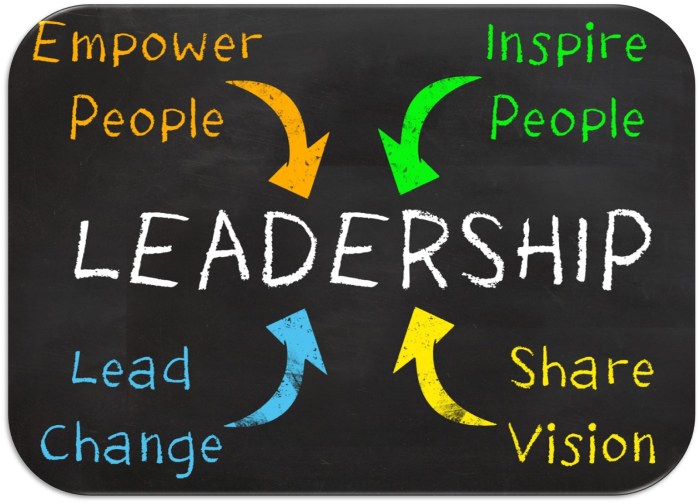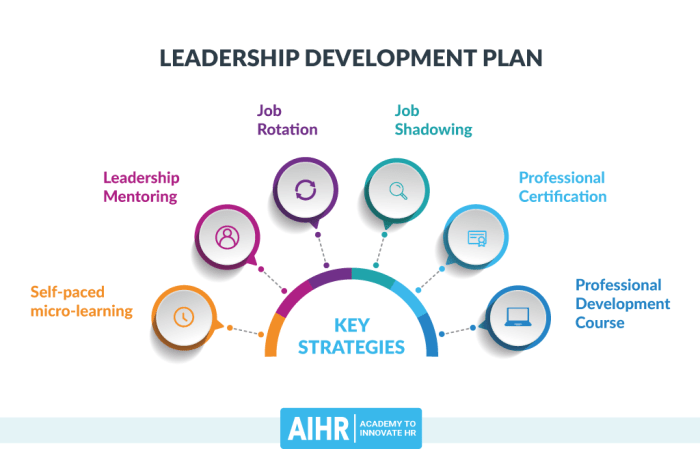Leadership Development sets the stage for organizational triumph, diving into the core elements that shape effective leaders. From essential skills to strategies for spotting talent, this guide explores the key aspects of cultivating strong leadership.
Importance of Leadership Development

In today’s competitive business landscape, leadership development plays a crucial role in driving organizational success. By investing in programs that nurture and enhance leadership skills, companies can cultivate a strong pipeline of talented leaders who can navigate challenges, inspire teams, and drive innovation.
Benefits of Investing in Leadership Development Programs
- Increased Employee Engagement: Effective leadership development programs empower leaders to engage and motivate their teams, leading to higher productivity and employee satisfaction.
- Succession Planning: Developing a robust leadership pipeline ensures that the organization is prepared for future leadership transitions and continuity.
- Enhanced Performance: Strong leadership fosters a culture of high performance, accountability, and continuous improvement throughout the organization.
- Talent Retention: Investing in leadership development shows employees that their growth and development are valued, leading to higher retention rates.
Impact of Effective Leadership Development on Company Culture
Effective leadership development can significantly impact company culture by fostering a positive work environment, promoting collaboration, and driving organizational values. When leaders are equipped with the skills to communicate effectively, listen empathetically, and lead by example, they set the tone for a culture of trust, respect, and innovation within the organization.
Key Components of Leadership Development Programs

Leadership development programs are essential for cultivating the next generation of effective leaders. These programs are designed to enhance key skills and qualities needed for successful leadership roles.
Mentorship Programs
Mentorship programs are a crucial component of leadership development, providing individuals with guidance, support, and advice from experienced professionals in their field. These programs offer personalized attention and opportunities for hands-on learning.
Workshops
- Interactive workshops are another key component of leadership development programs, allowing participants to engage in practical exercises and simulations to enhance their leadership skills.
- Workshops provide a collaborative environment where individuals can learn from each other, share best practices, and develop new strategies for effective leadership.
Online Courses
- Online courses offer flexibility and accessibility for individuals looking to develop their leadership skills at their own pace and schedule.
- These courses cover a wide range of topics related to leadership, including communication, decision-making, and conflict resolution.
Role of Feedback and Self-Assessment
Feedback and self-assessment play a critical role in leadership development, helping individuals identify their strengths and areas for improvement. Constructive feedback from mentors, peers, and supervisors can provide valuable insights and guidance for personal growth.
Strategies for Identifying Leadership Potential: Leadership Development
Identifying leadership potential in individuals is crucial for organizations looking to develop their future leaders. There are several methods and assessment tools that companies can use to evaluate leadership qualities and create talent pipelines.
Methods for Recognizing Leadership Potential
- Observation: Managers can observe how individuals handle challenges, interact with team members, and take on additional responsibilities to identify potential leaders.
- Assessment Centers: These centers use simulations, group exercises, and interviews to evaluate leadership skills and behaviors.
- 360-Degree Feedback: Gathering feedback from peers, subordinates, and supervisors can provide insights into an individual’s leadership capabilities.
Assessment Tools for Evaluating Leadership Qualities
- Personality Assessments: Tools like Myers-Briggs Type Indicator (MBTI) or DISC assessment can help identify leadership traits and preferences.
- Emotional Intelligence Tests: Assessing emotional intelligence can indicate how well an individual can manage emotions and relationships, key for effective leadership.
- Leadership Competency Models: Companies can develop specific models outlining the competencies required for leadership roles and use them to evaluate potential leaders.
Creating Talent Pipelines for Future Leaders
- Succession Planning: Identifying high-potential employees and providing them with development opportunities prepares them for future leadership roles.
- Mentorship Programs: Pairing emerging leaders with experienced mentors can help groom them for leadership positions within the organization.
- Rotational Assignments: Offering diverse experiences through job rotations can help individuals develop a broad skill set and leadership capabilities.
Developing Leadership Skills
Effective leadership requires a combination of specific skills that are crucial for guiding and inspiring others towards a common goal. Developing these skills is essential for anyone aspiring to be a successful leader.
Communication Skills, Leadership Development
Effective communication is a key component of successful leadership. Leaders must be able to clearly convey their ideas, listen actively to others, and provide feedback in a constructive manner. To enhance communication skills, leaders can:
- Practice active listening to fully understand the perspective of others.
- Work on clarity and conciseness in their messages to avoid confusion.
- Seek feedback from peers and team members to improve communication style.
- Utilize various communication channels such as verbal, written, and non-verbal communication.
Emotional Intelligence
Emotional intelligence plays a crucial role in leadership development as it involves understanding and managing emotions, both in oneself and others. Leaders with high emotional intelligence can effectively handle conflicts, inspire trust, and create a positive work environment. To enhance emotional intelligence, leaders can:
- Develop self-awareness by recognizing their own emotions and how they affect others.
- Practice empathy to understand the feelings and perspectives of team members.
- Manage emotions effectively, especially in stressful situations, to remain calm and composed.
- Build strong relationships based on trust and mutual respect with team members.
